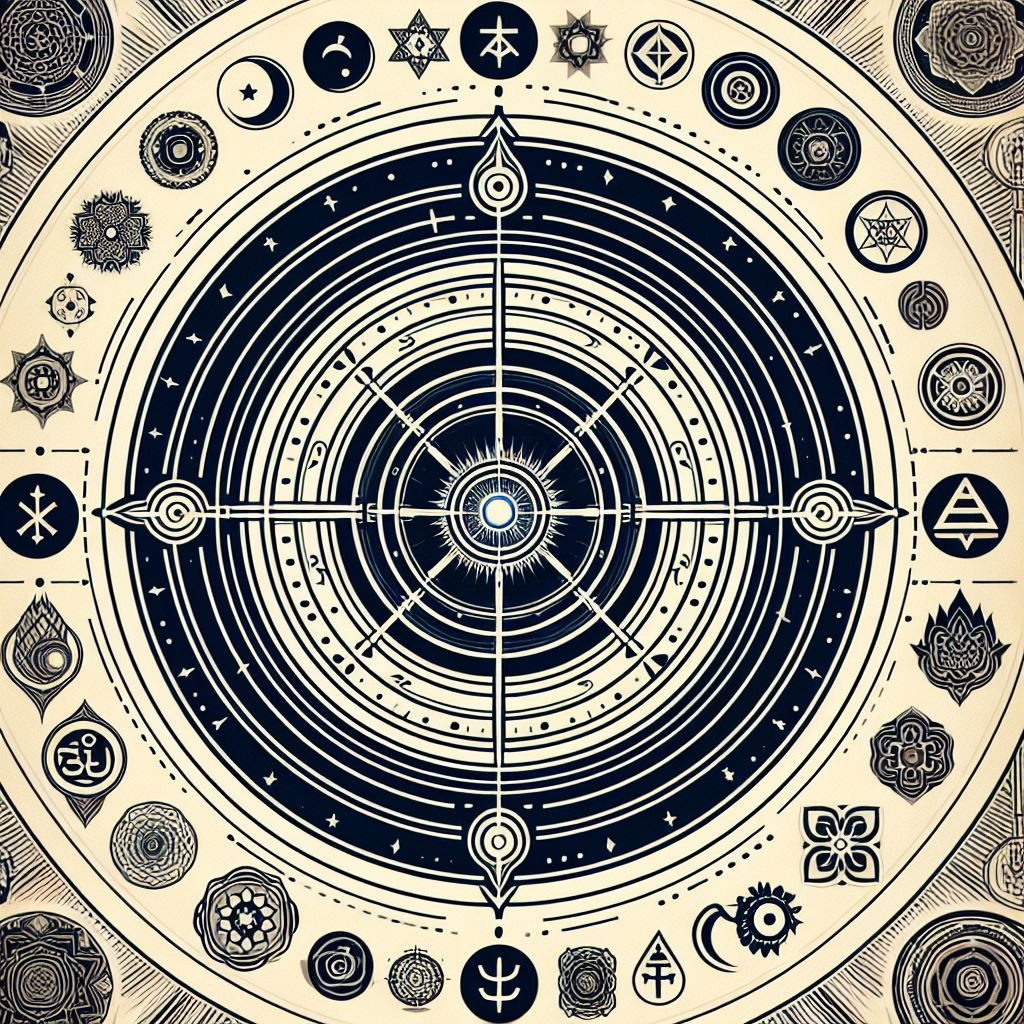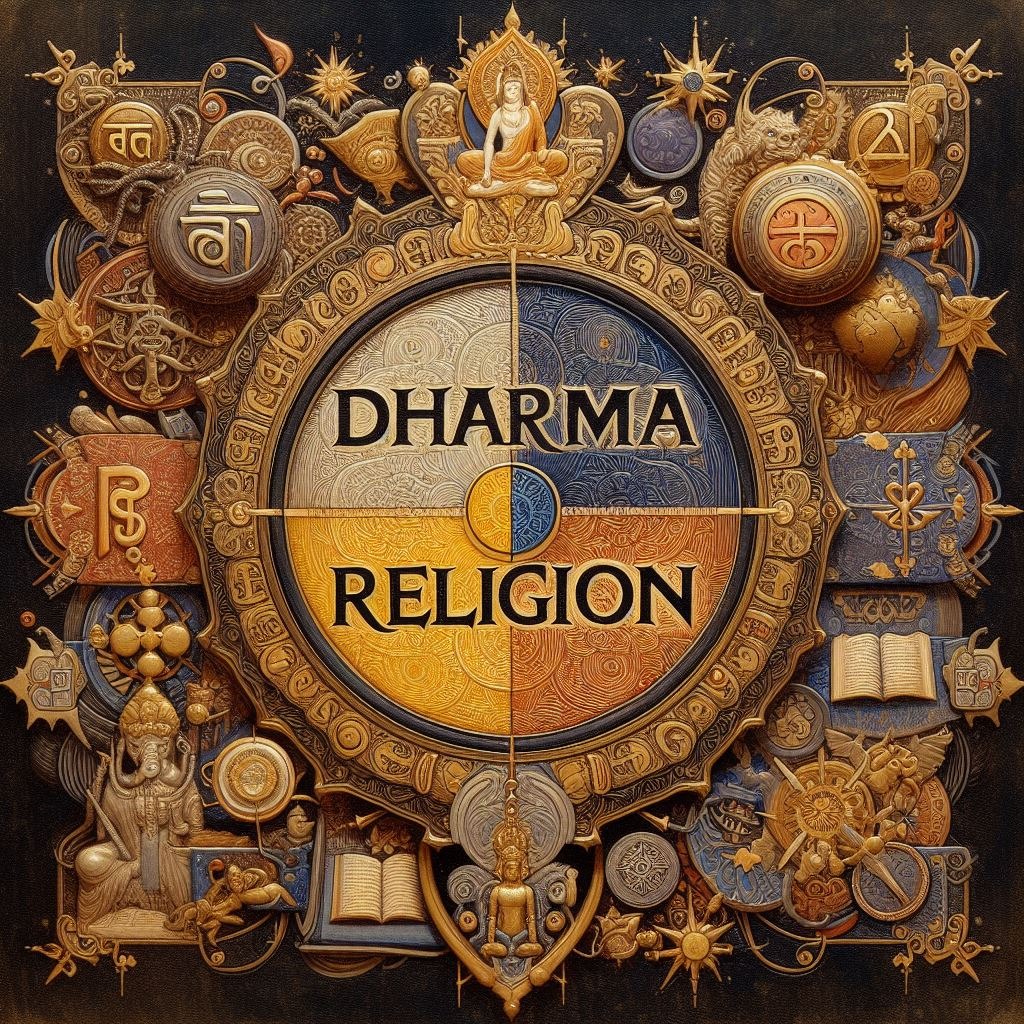Within the intricate tapestry of human beliefs, the threads of Dharma and religion emerge as profound and distinct. Woven into the fabric of spirituality, they contribute unique patterns, often blurred by the interchangeable use of their terms. Yet, understanding their nuanced differences is paramount. This blog sets out on a journey to unravel the intricacies between Dharma and religion, illuminating the diverse perspectives they bring to the spiritual tableau. Dharma, a cosmic order transcending religious dogma, guides individuals toward righteous living and interconnectedness. In contrast, religion encapsulates organized systems with prescribed doctrines and rituals, fostering specific beliefs. By exploring these distinctions, we navigate the depths of spiritual philosophy, recognizing that while both are integral to the human experience, their essence and implications are indeed powerful threads shaping our understanding of existence..
Defining Dharma:
Rooted in ancient Sanskrit, Dharma holds a profound significance that transcends religious confines. Prevalent in Hinduism, Buddhism, and Jainism, Dharma represents a moral compass, guiding individuals along a path of righteousness. It extends beyond a mere set of doctrines, embodying a cosmic order and principles governing the universe’s functioning.
Dharma advocates duty, righteousness, and adherence to the natural order, steering individuals toward a harmonious existence. Unlike rigid doctrines, Dharma is a flexible and adaptive way of life, encouraging individuals to align their actions with responsibilities. This fosters a profound sense of interconnectedness with the universe and all living beings, emphasizing the symbiotic relationship between individuals and their surroundings.
As we delve into the rich tapestry of Dharma, it becomes evident that it offers not just a set of guidelines but a holistic approach to harmonizing life with the cosmic order. Understanding Dharma becomes a journey toward balance and interconnected well-being, a timeless philosophy relevant in the contemporary world.
Understanding Religion:
In contrast, religion denotes organized belief systems, practices, and rituals centered on a divine entity. Religions establish frameworks for comprehending metaphysical aspects, prescribing doctrines, rituals, and moral codes. Unlike the abstract and inclusive nature of Dharma, religions frequently incorporate structured institutions, clergy, and defined organizational setups.
Religious followers adhere to specific dogmas, scriptures, and rituals as expressions of faith, fostering a connection with the divine. The distinctiveness of religions lies in their organized and institutionalized nature, providing a structured approach to spirituality. This dichotomy between the more flexible and inclusive Dharma and the organized structures of religions highlights the diverse ways in which individuals seek spiritual fulfillment.
Examples include Islam, Christianity, and Judaism, are monotheistic, meaning that they believe in one supreme God who is the creator and ruler of the universe. These religions are based on the concept of revelation, which means that God has communicated his will and message to humanity through prophets, scriptures, and miracles. These religions are also exclusivistic, meaning that they claim to have the only true and valid way to salvation, and that those who do not follow their teachings are doomed to eternal punishment.
Key Differences: Dharma and Religion
Flexibility vs. Rigidity:
- Dharma is flexible, adapting to individual circumstances and contexts. It focuses on righteous living without prescribing rigid rules.
- Religions often have more structured and codified beliefs, rituals, and moral codes that followers are expected to adhere to without much flexibility.
Universal Principles vs. Sectarian Practices:
- Dharma encompasses universal principles applicable to all, irrespective of religious affiliations.
- Religions may have specific practices and beliefs exclusive to their followers, often differentiating one religious group from another.
Way of Life vs. Institutionalized Beliefs:
- Dharma is a way of life, emphasizing moral and ethical conduct in various aspects of life.
- Religions often involve organized institutions with established doctrines, rituals, and hierarchies.

In the intricate weave of human spirituality, Dharma and religion play distinct roles, contributing uniquely to the spiritual fabric. Dharma serves as a guiding light, embodying universal principles that lead individuals towards righteous living. It emphasizes a flexible and inclusive way of life, fostering a deep sense of interconnectedness. On the other hand, religion often operates within organized systems, prescribing specific doctrines and rituals.
Appreciating these differences enriches our understanding of how individuals navigate the profound realms of spirituality and meaning. Dharma’s universal principles offer a versatile path, allowing individuals to tailor their spiritual journey. In contrast, religions provide a structured framework with organized beliefs and practices. Recognizing these distinctions enables a more nuanced comprehension of the diverse avenues people explore in their quest for spiritual fulfillment. Ultimately, this awareness promotes a richer and more inclusive appreciation of the varied ways humanity seeks meaning and connection in the tapestry of existence.




I’m thoroughly captivated by your keen analysis and stellar writing style. Your expertise shines through in every sentence. It’s evident that you spend considerable time into understanding your topics, and that effort pays off. Thanks for providing this valuable knowledge. Keep on enlightening us! Learn more about [OnlyFans Marketing](https://elevenviral.com/onlyfans-marketing-growth-service/) https://elevenviral.com/onlyfans-marketing-growth-service/